Analysis of Venezuelan Culture: An Intercultural Studies Essay
VerifiedAdded on 2023/05/30
|5
|974
|102
Essay
AI Summary
This essay provides an overview of Venezuelan culture, examining key aspects such as its dominant Catholic religion, the influence of African and Spanish heritage, and the prevalence of the Spanish language alongside numerous other languages. It delves into the nation's ideology, highlighting the president's role and the command economy centered on petroleum and manufacturing. The analysis touches on the end of hegemony with new political leadership and explores the significance of language and semiotics within Venezuelan society. Furthermore, the essay addresses gender inequality challenges and reflects on Venezuela's post-colonial journey since gaining independence from Gran Colombia in 1830. The study concludes that while Venezuela boasts a rich culture and significant economic potential, it needs to address gender equality issues.
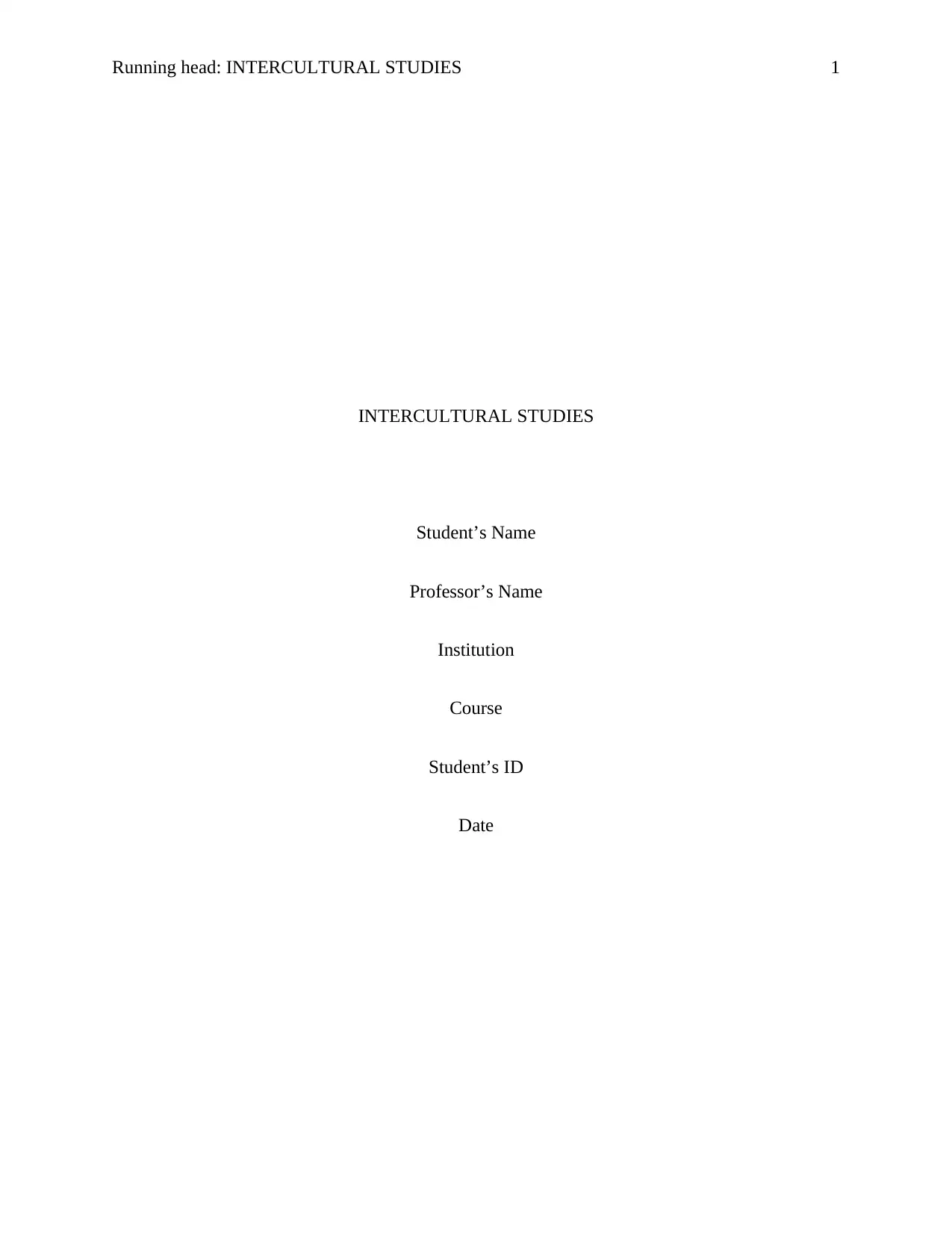
Running head: INTERCULTURAL STUDIES 1
INTERCULTURAL STUDIES
Student’s Name
Professor’s Name
Institution
Course
Student’s ID
Date
INTERCULTURAL STUDIES
Student’s Name
Professor’s Name
Institution
Course
Student’s ID
Date
Paraphrase This Document
Need a fresh take? Get an instant paraphrase of this document with our AI Paraphraser
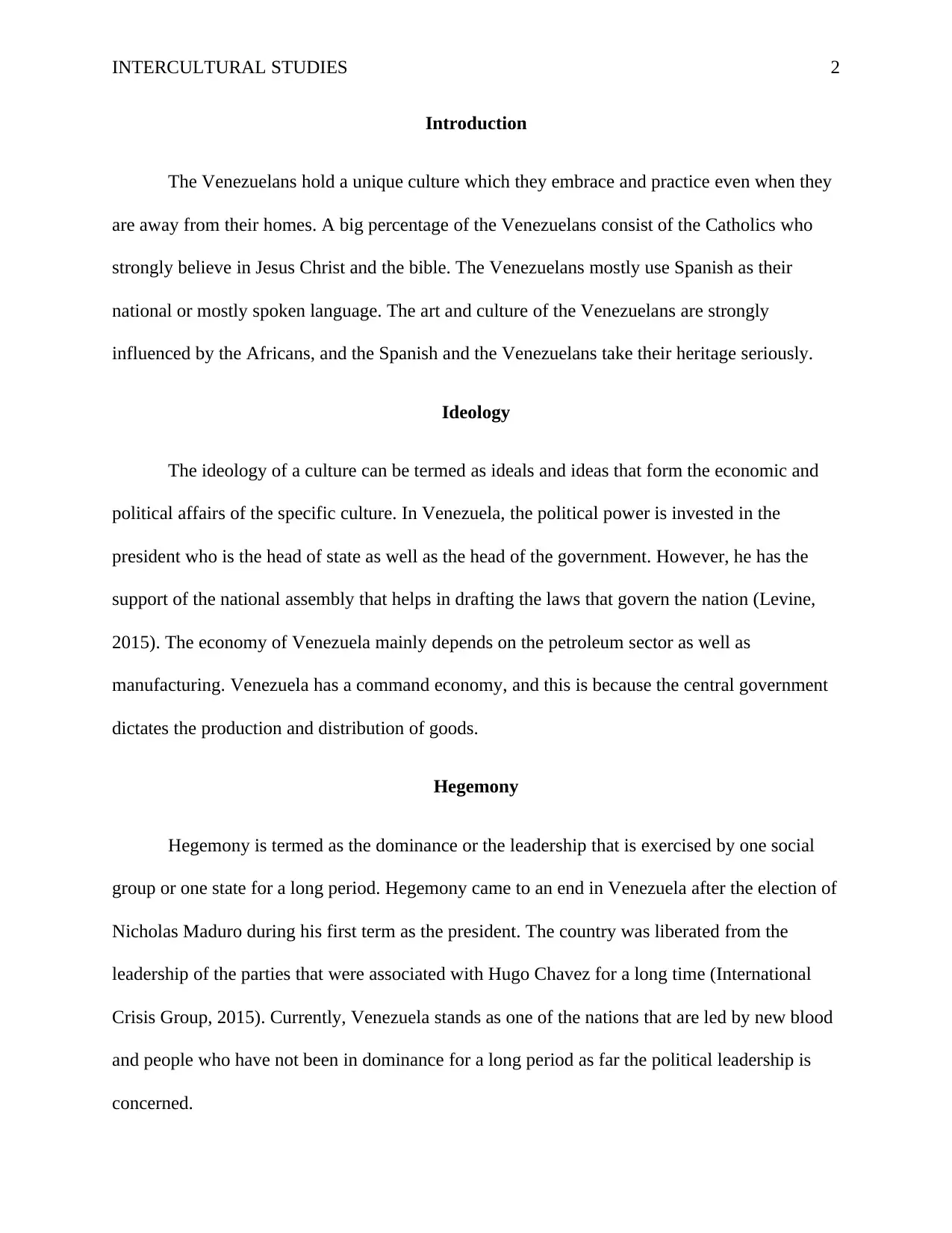
INTERCULTURAL STUDIES 2
Introduction
The Venezuelans hold a unique culture which they embrace and practice even when they
are away from their homes. A big percentage of the Venezuelans consist of the Catholics who
strongly believe in Jesus Christ and the bible. The Venezuelans mostly use Spanish as their
national or mostly spoken language. The art and culture of the Venezuelans are strongly
influenced by the Africans, and the Spanish and the Venezuelans take their heritage seriously.
Ideology
The ideology of a culture can be termed as ideals and ideas that form the economic and
political affairs of the specific culture. In Venezuela, the political power is invested in the
president who is the head of state as well as the head of the government. However, he has the
support of the national assembly that helps in drafting the laws that govern the nation (Levine,
2015). The economy of Venezuela mainly depends on the petroleum sector as well as
manufacturing. Venezuela has a command economy, and this is because the central government
dictates the production and distribution of goods.
Hegemony
Hegemony is termed as the dominance or the leadership that is exercised by one social
group or one state for a long period. Hegemony came to an end in Venezuela after the election of
Nicholas Maduro during his first term as the president. The country was liberated from the
leadership of the parties that were associated with Hugo Chavez for a long time (International
Crisis Group, 2015). Currently, Venezuela stands as one of the nations that are led by new blood
and people who have not been in dominance for a long period as far the political leadership is
concerned.
Introduction
The Venezuelans hold a unique culture which they embrace and practice even when they
are away from their homes. A big percentage of the Venezuelans consist of the Catholics who
strongly believe in Jesus Christ and the bible. The Venezuelans mostly use Spanish as their
national or mostly spoken language. The art and culture of the Venezuelans are strongly
influenced by the Africans, and the Spanish and the Venezuelans take their heritage seriously.
Ideology
The ideology of a culture can be termed as ideals and ideas that form the economic and
political affairs of the specific culture. In Venezuela, the political power is invested in the
president who is the head of state as well as the head of the government. However, he has the
support of the national assembly that helps in drafting the laws that govern the nation (Levine,
2015). The economy of Venezuela mainly depends on the petroleum sector as well as
manufacturing. Venezuela has a command economy, and this is because the central government
dictates the production and distribution of goods.
Hegemony
Hegemony is termed as the dominance or the leadership that is exercised by one social
group or one state for a long period. Hegemony came to an end in Venezuela after the election of
Nicholas Maduro during his first term as the president. The country was liberated from the
leadership of the parties that were associated with Hugo Chavez for a long time (International
Crisis Group, 2015). Currently, Venezuela stands as one of the nations that are led by new blood
and people who have not been in dominance for a long period as far the political leadership is
concerned.
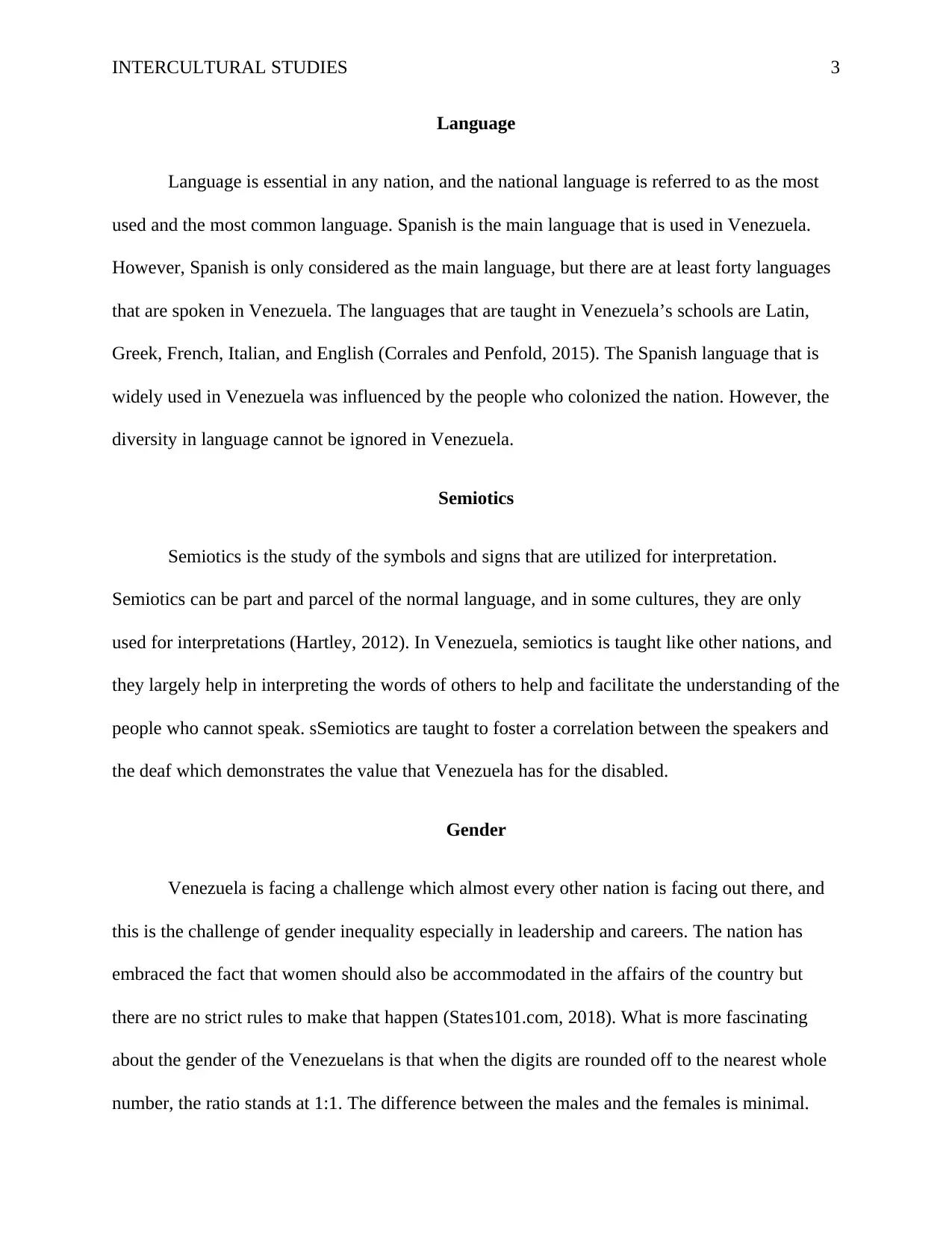
INTERCULTURAL STUDIES 3
Language
Language is essential in any nation, and the national language is referred to as the most
used and the most common language. Spanish is the main language that is used in Venezuela.
However, Spanish is only considered as the main language, but there are at least forty languages
that are spoken in Venezuela. The languages that are taught in Venezuela’s schools are Latin,
Greek, French, Italian, and English (Corrales and Penfold, 2015). The Spanish language that is
widely used in Venezuela was influenced by the people who colonized the nation. However, the
diversity in language cannot be ignored in Venezuela.
Semiotics
Semiotics is the study of the symbols and signs that are utilized for interpretation.
Semiotics can be part and parcel of the normal language, and in some cultures, they are only
used for interpretations (Hartley, 2012). In Venezuela, semiotics is taught like other nations, and
they largely help in interpreting the words of others to help and facilitate the understanding of the
people who cannot speak. sSemiotics are taught to foster a correlation between the speakers and
the deaf which demonstrates the value that Venezuela has for the disabled.
Gender
Venezuela is facing a challenge which almost every other nation is facing out there, and
this is the challenge of gender inequality especially in leadership and careers. The nation has
embraced the fact that women should also be accommodated in the affairs of the country but
there are no strict rules to make that happen (States101.com, 2018). What is more fascinating
about the gender of the Venezuelans is that when the digits are rounded off to the nearest whole
number, the ratio stands at 1:1. The difference between the males and the females is minimal.
Language
Language is essential in any nation, and the national language is referred to as the most
used and the most common language. Spanish is the main language that is used in Venezuela.
However, Spanish is only considered as the main language, but there are at least forty languages
that are spoken in Venezuela. The languages that are taught in Venezuela’s schools are Latin,
Greek, French, Italian, and English (Corrales and Penfold, 2015). The Spanish language that is
widely used in Venezuela was influenced by the people who colonized the nation. However, the
diversity in language cannot be ignored in Venezuela.
Semiotics
Semiotics is the study of the symbols and signs that are utilized for interpretation.
Semiotics can be part and parcel of the normal language, and in some cultures, they are only
used for interpretations (Hartley, 2012). In Venezuela, semiotics is taught like other nations, and
they largely help in interpreting the words of others to help and facilitate the understanding of the
people who cannot speak. sSemiotics are taught to foster a correlation between the speakers and
the deaf which demonstrates the value that Venezuela has for the disabled.
Gender
Venezuela is facing a challenge which almost every other nation is facing out there, and
this is the challenge of gender inequality especially in leadership and careers. The nation has
embraced the fact that women should also be accommodated in the affairs of the country but
there are no strict rules to make that happen (States101.com, 2018). What is more fascinating
about the gender of the Venezuelans is that when the digits are rounded off to the nearest whole
number, the ratio stands at 1:1. The difference between the males and the females is minimal.
⊘ This is a preview!⊘
Do you want full access?
Subscribe today to unlock all pages.

Trusted by 1+ million students worldwide
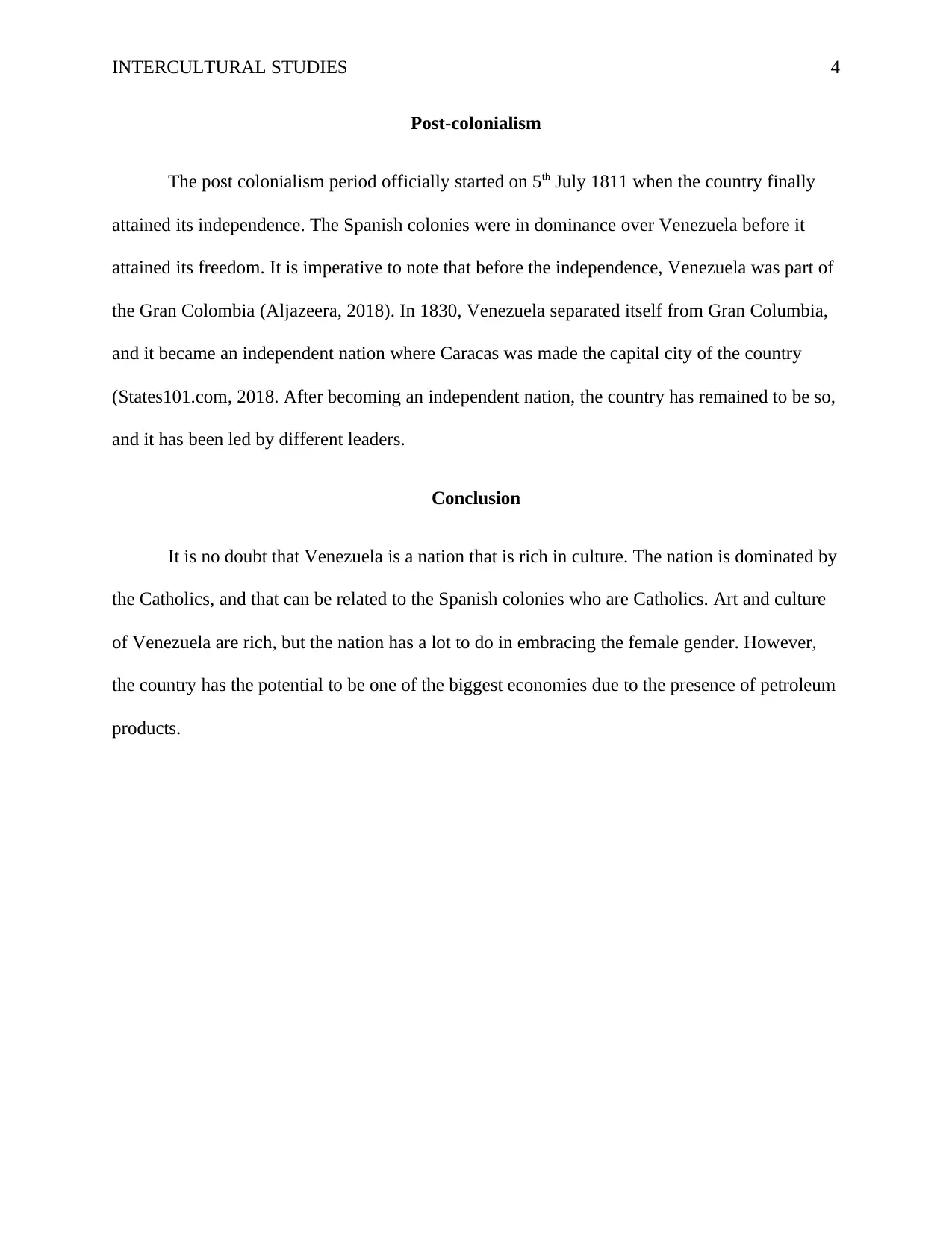
INTERCULTURAL STUDIES 4
Post-colonialism
The post colonialism period officially started on 5th July 1811 when the country finally
attained its independence. The Spanish colonies were in dominance over Venezuela before it
attained its freedom. It is imperative to note that before the independence, Venezuela was part of
the Gran Colombia (Aljazeera, 2018). In 1830, Venezuela separated itself from Gran Columbia,
and it became an independent nation where Caracas was made the capital city of the country
(States101.com, 2018. After becoming an independent nation, the country has remained to be so,
and it has been led by different leaders.
Conclusion
It is no doubt that Venezuela is a nation that is rich in culture. The nation is dominated by
the Catholics, and that can be related to the Spanish colonies who are Catholics. Art and culture
of Venezuela are rich, but the nation has a lot to do in embracing the female gender. However,
the country has the potential to be one of the biggest economies due to the presence of petroleum
products.
Post-colonialism
The post colonialism period officially started on 5th July 1811 when the country finally
attained its independence. The Spanish colonies were in dominance over Venezuela before it
attained its freedom. It is imperative to note that before the independence, Venezuela was part of
the Gran Colombia (Aljazeera, 2018). In 1830, Venezuela separated itself from Gran Columbia,
and it became an independent nation where Caracas was made the capital city of the country
(States101.com, 2018. After becoming an independent nation, the country has remained to be so,
and it has been led by different leaders.
Conclusion
It is no doubt that Venezuela is a nation that is rich in culture. The nation is dominated by
the Catholics, and that can be related to the Spanish colonies who are Catholics. Art and culture
of Venezuela are rich, but the nation has a lot to do in embracing the female gender. However,
the country has the potential to be one of the biggest economies due to the presence of petroleum
products.
Paraphrase This Document
Need a fresh take? Get an instant paraphrase of this document with our AI Paraphraser
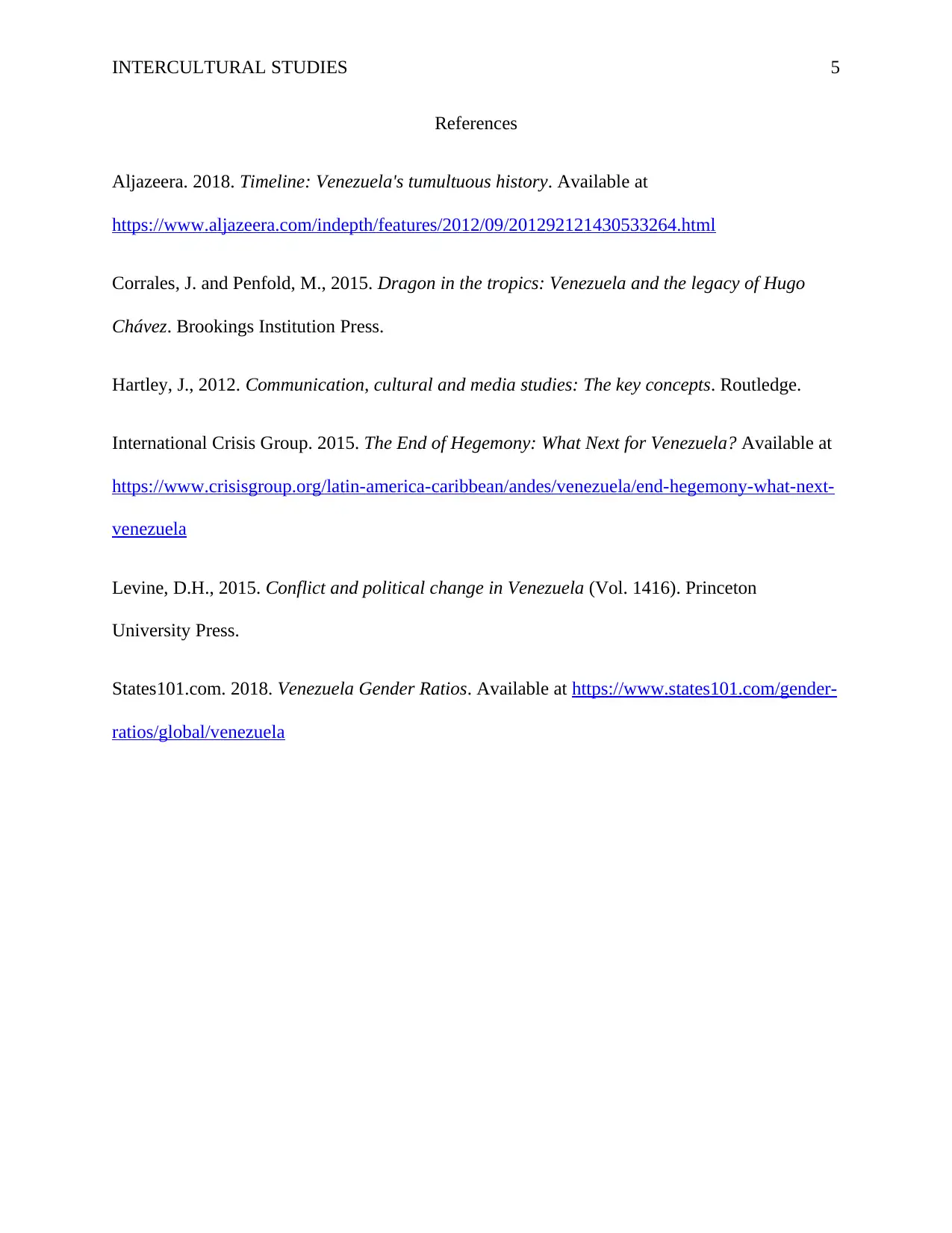
INTERCULTURAL STUDIES 5
References
Aljazeera. 2018. Timeline: Venezuela's tumultuous history. Available at
https://www.aljazeera.com/indepth/features/2012/09/201292121430533264.html
Corrales, J. and Penfold, M., 2015. Dragon in the tropics: Venezuela and the legacy of Hugo
Chávez. Brookings Institution Press.
Hartley, J., 2012. Communication, cultural and media studies: The key concepts. Routledge.
International Crisis Group. 2015. The End of Hegemony: What Next for Venezuela? Available at
https://www.crisisgroup.org/latin-america-caribbean/andes/venezuela/end-hegemony-what-next-
venezuela
Levine, D.H., 2015. Conflict and political change in Venezuela (Vol. 1416). Princeton
University Press.
States101.com. 2018. Venezuela Gender Ratios. Available at https://www.states101.com/gender-
ratios/global/venezuela
References
Aljazeera. 2018. Timeline: Venezuela's tumultuous history. Available at
https://www.aljazeera.com/indepth/features/2012/09/201292121430533264.html
Corrales, J. and Penfold, M., 2015. Dragon in the tropics: Venezuela and the legacy of Hugo
Chávez. Brookings Institution Press.
Hartley, J., 2012. Communication, cultural and media studies: The key concepts. Routledge.
International Crisis Group. 2015. The End of Hegemony: What Next for Venezuela? Available at
https://www.crisisgroup.org/latin-america-caribbean/andes/venezuela/end-hegemony-what-next-
venezuela
Levine, D.H., 2015. Conflict and political change in Venezuela (Vol. 1416). Princeton
University Press.
States101.com. 2018. Venezuela Gender Ratios. Available at https://www.states101.com/gender-
ratios/global/venezuela
1 out of 5
Your All-in-One AI-Powered Toolkit for Academic Success.
+13062052269
info@desklib.com
Available 24*7 on WhatsApp / Email
![[object Object]](/_next/static/media/star-bottom.7253800d.svg)
Unlock your academic potential
Copyright © 2020–2026 A2Z Services. All Rights Reserved. Developed and managed by ZUCOL.
